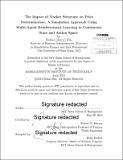The impact of market structure on price determination : a simulation approach using multi-agent reinforcement learning in continuous state and action space
Author(s)
Shu, Buliao
DownloadFull printable version (2.504Mb)
Other Contributors
Sloan School of Management. Master of Finance Program.
Advisor
Robert C. Merton.
Terms of use
Metadata
Show full item recordAbstract
This thesis proposes a simulation tool to study the question of how market structure and market players' behavior affect price movements. The adaptive market simulation system consists of multiple agents and a centralized exchange. By applying reinforcement learning techniques, agents evolve and become capable of making intelligent trading decisions while adapting to changing market conditions. Trading dynamics in the real world are complex yet compelling. The presence of the human element in trading makes studying it via repeatable scientific models, especially on a large scale, very difficult and almost unfeasible. By making it possible to conduct controlled experiments under various market scenarios, this simulation seeks to help researchers gain a better understanding of how different types of traders affect price formation under distinct market scenarios. The impact of trading frequency on prices is also explored as a test of the simulation tool. Results suggest that the market generates richer information when the frequency of trading is high, and when the market is more frequently accessed, short-term market prices demonstrate higher volatilities and move faster in respond to market sentiments.
Description
Thesis: M. Fin., Massachusetts Institute of Technology, Sloan School of Management, Master of Finance Program, 2014. Cataloged from PDF version of thesis. Includes bibliographical references (pages 37-38).
Date issued
2014Department
Sloan School of Management. Master of Finance Program.; Sloan School of ManagementPublisher
Massachusetts Institute of Technology
Keywords
Sloan School of Management. Master of Finance Program.